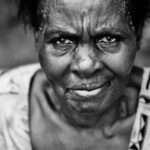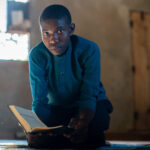Africa is one of the most dynamic centres of Christianity in the world. Africa has a significant share of the world’s 2.2 billion Christians. It has about 30% of the world’s evangelicals, 20% of the world’s Pentecostals and charismatics, and about 15% of the world’s Roman Catholics. In addition, Africa has significant Orthodox groups such as the Ethiopian and Eritrean Orthodox Tewahedo Churches and the Coptic Orthodox Church of Alexandria.
It Began in North Africa
Christianity was well established in North Africa in the first few centuries after Christ. From a solid foundation in North Africa, Christianity moved deeper into the heart of the continent. The challenge by Islam and African traditional religions deepened the faith of believers. The fifteenth century was a turning point when Catholicism from Portugal circled the continent.
Africa is one of the most dynamic centres of Christianity in the world.
The modern missionary movement and indigenous Christian movements in Africa of the nineteenth and twentieth centuries built upon these earlier foundations. Contemporary Pentecostal and charismatic Christianity has brought a renewal to the church in Africa. And now the churches of Africa in the twenty-first century are missionary-sending churches that are spreading the gospel around the world. This story can be told in four overlapping waves.
Wave 1: Early Christianity in North Africa and Ethiopia
Jesus said, “You will be my witnesses, telling people about me everywhere—in Jerusalem … and to the ends of the earth” (Acts 1:8). One of the first places that the story of Jesus went was to Sudan when “the treasurer of Ethiopia” (probably Meroe in modern Sudan) believed the good news that Philip told him, was baptised, and took the message to Africa.
The Coptic church of Egypt has long claimed that the apostle Thomas and the evangelist Mark played important roles in the formation of the Church in Alexandria, Egypt. But the key moment in early Christianity in North Africa was in the late third century when there was rapid growth, in part due to the conversion of many people in large Jewish communities. But perhaps the most surprising thing that helped Christianity grow was persecution. Persecution deepened the commitment of believers in Africa and gave them courage to witness to an increasingly sympathetic African audience.
Persecution deepened the commitment of believers in Africa.
Christian growth was also encouraged by Pantaenus, Origen, and Clement, all teachers at the catechetical school in Alexandria. They attempted to define Christianity in terms of Greek philosophy that well-educated people in North Africa could understand. However, this created a backlash, and sometimes violent debates erupted over the nature of Christ and the Trinity.
Dramatic Conversion of Emperor Constantine
Constantine, emperor of Rome in the fourth century, had a dramatic conversion to Christianity, and that had a direct impact on the early Coptic (Egyptian) church, especially in urban Africa. At the council of Nicaea in 325, Constantine attempted to have church leaders agree on how to understand the deity of Christ. But his efforts were only partly successful. Theological orthodoxy became identified with political loyalty and caused splits that would mark the church for centuries.
The Shaping of Roman Christianity in Africa
Egyptian Christianity grew and spread. The Bible was translated into several variations of the Coptic language, and monasticism, which originated in Egypt, spread to the Latin-speaking church of western North Africa. Monasticism is a religious way of life in which priests renounce living in the world and instead live in monasteries—and sometimes by themselves as hermits. By the fourth century, monasticism became a powerful force in evangelism and discipleship, although at times it was disruptive. A part of the church around Carthage (in modern Tunisia) protested against the strong ties other parts of the church had with Rome.
Theological orthodoxy became identified with political loyalty that would mark the church for centuries.
Movements such as Donatism in the fourth century considered imperial Christianity, which owed its allegiance to Rome, as exploitative and compromising. Such movements developed their own clergy and churches. However, great Africans who helped shape Roman Christianity included Bishop Cyprian of Carthage and Augustine, Bishop of Hippo. Both of these men were inspired by the second century firebrand and theologian, Tertullian of Carthage.
Christian Kings in Ethiopia
While Christianity in North Africa and Egypt flourished and North African Christians strongly influenced the church in Rome, Christianity was also growing in the powerful kingdoms of Nubia (ancient Sudan) and Ethiopia. Nubia is one of two countries that claim to be the world’s oldest Christian nation (the other is Armenia). In both Nubia and Ethiopia, the king or emperor determined the religion of his people. Frumentius, a fourth-century Syrian missionary, tutored Ezana, the young prince of the kingdom of Axum, which is in present-day Ethiopia, in the Christian faith. Ezana became one of the great Christian kings of Africa. Important popular Christian movements also flourished, motivated in Ethiopia by Syrian monastic missionaries, known to tradition as “the nine saints,” and in Nubia by Jewish converts.
A Thousand Years of Growth
Over the next thousand years, Christianity in Ethiopia grew stronger while in Nubia it declined. Between 1200–1500, the Zagwe dynasty in Ethiopia, a family of Christian kings, revived Christian art, literature, and church expansion. Lalibela, the greatest emperor of the Zagwe dynasty, built eleven famous stone churches carved out of solid rock to create a “new Jerusalem.” But not everyone was happy with the Zagwe kings, and by 1225 the History of the Kings appeared as a protest. This book purported to tell the story of Solomon and the queen of Sheba and their son Menelik, first king of Ethiopia.
In 1270, a new “Solomonic” dynasty replaced the Zagwe dynasty. This new dynasty reached its peak in the fifteenth century during the reign of Zara Yaqob, who saw himself as an African Constantine. He convened church councils to address debates about Christ and Sabbath worship. Zara Yaqob also purged Ethiopia of African traditional religion. While Ethiopia reached its height as a Christian kingdom under Yaqob, Christianity was eliminated in Nubia. Nubian forces were defeated in battle by a sultan from Cairo, Babyars I, and came under the control of the Muslim Egyptians. By 1500, Christianity in Nubia all but disappeared.
Wave 2: Portuguese Catholicism
Missions, Politics & Slavery
From 1420 until 1800, Portuguese politics and Christian missionaries from Portugal and Spain dominated much of coastal Africa. A controversial decree by the pope, called the Padroado, granted to the king of Portugal all rights to economic, military, and evangelistic activities in the areas he controlled. Slave traders and missionaries wrestled with one another for the souls of Africans. Portuguese missionary efforts were spread too thin, however, to make a significant, lasting impact. The result was only a thin veneer of Christianity in most places they influenced. Kongo and Soyo (kingdoms of Angola) and the Republic of the Congo were exceptions. There, Catholicism, indigenous popular Catholicism, and traditional religion clashed for centuries.
Wave 3: The Evangelical Era
As the glories of Catholicism faded in the late eighteenth century, a new force arose: Evangelicalism.
Christianity was both a movement of spiritual revival as well as a force for justice. It combined a passion for personal religion with a crusade against slavery and changed the face of Africa forever. Evangelical Christianity has been described as a fourfold commitment to the Bible, the cross, conversion, and mission.
Christianity was both a movement of spiritual revival as well as a force for justice.
The Abolition of Slavery
In the late eighteenth century, evangelical and other British leaders formed a movement that sought to abolish slavery. Great nineteenth-century British leaders such as William Wilberforce (member of the British parliament and champion of anti-slavery legislation), Thomas Clarkson (leader of the anti-slavery society in England), and Granville Sharp (English abolitionist) did much good.
Evangelicals in Africa such as Ottobah Cugoano and Olaudah Equiano were just as crucial to the anti-slavery cause. They were two Nigerian former slaves who lived in England and published stories of their liberation and conversion to Christianity. Many African slaves who were freed during the American Revolution found their way to the Canadian maritime provinces where their faith was deepened by the fiery preaching of Henry Alline of Nova Scotia.
Freetown, Liberia, and Evangelising West Africa
Sierra Leone, a West African colony for freed slaves, was founded in 1787. From Freetown, the capital of Sierra Leone, the evangelisation of West Africa began through liberated slaves such as Samuel Ajayi Crowther, the first Anglican bishop in Africa. Liberia, founded for free-born American blacks in 1822, played a similar role.
Evangelical Missions
The evangelical revivals of the eighteenth and nineteenth centuries in the United States and England produced the modern missionary movement. Denominational missions and faith missions such as the Africa Inland Mission, Sudan Interior Mission, Sudan United Mission, and the South Africa General Mission (later the Africa Evangelical Fellowship) influenced African societies. Schools, hospitals, churches, and many social agencies in Africa were the result of missionary efforts in partnership with African Christians. The same partnerships translated the Bible or a portion into more than 640 African languages, an effort which has helped promote literacy as well as the knowledge of God.
The commitment of the missionaries to Africa is illustrated by the many who took their coffins with them when they travelled from their homelands, knowing that their lifespan would probably be short. Many were martyred for their faith, including the American medical missionary Paul Carlson, who was killed by rebel insurgents in 1964 in what is now the Democratic Republic of the Congo.
Wave 4: Indigenous Movements, Pentecostalism, and Post-Independence
Colonialism and African Initiated Churches
The shape of missions changed in 1884–1885 with the Berlin Conference in Germany. At this meeting, European powers partitioned Africa for colonization and trade. France was given certain countries, and King Leopold II of Belgium was given the Congo, for instance. Europeans justified their imperialism as being a part of a civilizing mission to an Africa that they perceived as still in bondage to the dark past. Africa answered the challenge of colonialism through the voice of new prophets like William Wadé Harris of Liberia and members of the Organization of African Instituted Churches (African initiated churches—AICs) throughout the continent.
These AICs took the names of Zionist in Southern Africa, Aladura in West Africa, and Roho movements in Kenya. When independence dawned in 1960, Christianity below the Sahara was no longer merely a European import. Christianity in Africa now included many churches with an African understanding of Christianity and African ways of worship.
Political Saviours
Many of the newly elected presidents of independent African nations had graduated from missionary schools and were affiliated with specific Christian denominations. But in spite of these connections, many ruled in a way that promoted themselves as saviours of their countries.
Many new nations took control of missionary schools, hospitals, and social agencies in the 1960s. Then in the 1970s and 1980s, they staggered under the weight of the obligations they had taken on. In many cases, African governments that were once critical of the church asked churches for help in education, medicine, and nation-building. For instance, Ghana’s first president, Kwame Nkrumah, a product of missionary education, described his movement of political independence as an alternative to Christianity. He summarised his thinking by saying the following. “Seek first the political kingdom, and all things will be added unto you”. But his regime disintegrated in a coup in 1966. Similar upheavals happened to several other African nations. Coup leaders eventually gave way to multiparty politics. By the early 1990s, new nations had a new desire to work with the church.
Today, most Christians in Africa have been touched in some way by Pentecostal teaching.
Pentecostalism in the 1990s
By the 1990s, charismatic Christianity had transformed the face of many Christian traditions in Africa. Some new Pentecostal churches began preaching a message of healing and power. This message captured not only the poor and disenchanted but also the young, upwardly mobile urban professional class in Africa’s growing cities. Today, most Christians in Africa have been touched in some way by Pentecostal methods and teaching.
The story of Christianity in Africa is now a global movement changing the world.
There are two significant trends in Christianity in Africa since independence. First, the emergence of a large African theological fraternity composed of both Catholics and Protestants. Second, a new missionary zeal on the part of the African church.
A New Era of African Missions
This second trend has seen African Christians move around the world in migration and mission. In the early years of the twenty-first century, the largest church in England was led by a Nigerian missionary pastor. Similarly, in Kyiv, Ukraine, Europe’s largest church was shepherded by a Nigerian. Churches like Ghana’s Church of Pentecost and Nigeria’s Redeemed Christian Church of God have established centres all over the world. This is a trend sometimes described as ‘reverse mission’. The new era of African missions is still in its infancy. Yet it promises that the story of Christianity in Africa, begun in a quiet corner of Alexandria, Egypt in the first century, is now a global movement changing the world.
Points to Remember
- Christianity in Africa dates to the first generation of the church. Any attempt to label Christianity as a “white man’s religion” or European religion should be rejected.
- Africans played a crucial role in establishing the doctrines and theology of the early church. We should stand on their shoulders in the way we seriously study the Bible.
- Praise God for his work across Africa. His Spirit has moved in many different ways: through African leaders, through foreign missionaries, and various political movements. We should rejoice in our diversity and unite around the core doctrines of our shared faith.
- The powerful African church is coming to maturity in the twenty-first century. We should claim our Christian identity and mission with both boldness and humility. Boldness in proclaiming our vibrant faith to the world. Humility in learning from others and working together. Building churches based on both biblical teaching, excellence and integrity in organisation and leadership.















